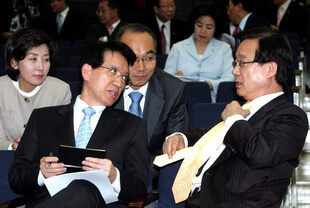hankyoreh
Links to other country sites 다른 나라 사이트 링크
GNP’s new North Korea policy under fire from the inside

A new set of North Korea policy initiatives announced by leaders of the main opposition Grand National Party (GNP) are raising questions of feasibility and face strong opposition from the conservative right, both inside and outside the party.
In a meeting on July 4, the conservative-leaning GNP mapped out a set of North Korean policy initiatives, dubbed the ‘‘Peace Vision for the Korean Peninsula.’’ These new initiatives are based on a principle of ‘‘flexible reciprocity,’’ and imply that the party has softened its long-held hawkish attitude toward North Korea.
Under the new policy initiatives, the GNP said it would support an inter-Korean summit if the North were to become denuclearized. Were that to happen, the GNP said it would push for projects leading to greater inter-Korean economic cooperation, including keeping projects at Mount Geumgang and Gaeseong Industrial Complex afloat. What’s more, the conservative party said it would support a possibility of a declaration to end the war on the Korean peninsula, which would involve the two Koreas, the United States and China.
While the GNP’s new initiatives hinged on North Korea’s denuclearization, the overall plan drew attention because it signaled a big shift away from the party’s previously hostile policy against the North and closer to the government’s position, which the GNP has strongly criticized as helping the communist country going nuclear. The GNP has failed to adopt the new initiatives as the party’s official policy, however, because some of its conservative lawmakers remain opposed. Instead, the party has decided to let the presidential nominee use the initiatives in presenting his election pledge ahead of the presidential election scheduled to take place in December of this year.
Opposition to the new initiatives continued to intensify on July 5. In particular, Lee Hoi-chang, the party’s two-time failed presidential candidate who reportedly continues to exert some leverage within the party’s ranks, denounced the initiatives. He was quoted by his aide, Lee Jong-gu, as having said that ‘‘In fact, I doubt that the GNP would recognize North Korea as a nuclear state. Over the past 10 years, South Korea has unilaterally helped North Korea. But, has North Korea given up its nuclear weapons and taken steps towards reform and opening the country to the outside world? If South Korea were to continue to aid North Korea in such manner, it would make it difficult to facilitate the denuclearization process.’’
Former GNP chairwomen and current presidential contender Park Geun-hye was also pessimistic. ‘‘The new initiatives on North Korea could be meaningful if the North takes visible and practical steps to dismantle its nuclear weapons. For now, we should focus on persuading the North to give up its nuclear ambitions’’ Park said.
The mood of opposition appears to be expanding even further. Rep. Kim Yong-kap accused the proposed initiatives of being more dovish than those of the pro-government Uri Party. Rep. Kim Ki-choon said, ‘‘Though it’s appropriate for the party to present a softer North Korean policy, there is a fundamental line that we must keep.’’ He pointed out that it would be problematic for the party to support an inter-Korean summit and to grant North Korean newspapers and broadcasters access to the South.
In response, the GNP leaders hinted at revisions to the new policy initiatives. Rep. Lee Ju-young, the party’s top policymaker, retreated by saying, ‘‘Yesterday’s new North Korean policy initiatives were just a guideline, and not official policy.’’ Lee said the initiatives would be revised after gathering opinions. Rep. Na Kyung-won, the party’s spokeswoman, admitted to the brouhaha over the new North Korean policy initiatives. ‘‘The leadership, however, still remains unchanged with the new initiative to help the North’s reform and opening via flexible reciprocity.’’
Please direct questions or comments to [englishhani@hani.co.kr]
Editorial・opinion
![[Column] Has Korea, too, crossed the Rubicon on China? [Column] Has Korea, too, crossed the Rubicon on China?](https://flexible.img.hani.co.kr/flexible/normal/500/300/imgdb/original/2024/0419/9317135153409185.jpg) [Column] Has Korea, too, crossed the Rubicon on China?
[Column] Has Korea, too, crossed the Rubicon on China?![[Correspondent’s column] In Japan’s alliance with US, echoes of its past alliances with UK [Correspondent’s column] In Japan’s alliance with US, echoes of its past alliances with UK](https://flexible.img.hani.co.kr/flexible/normal/500/300/imgdb/original/2024/0419/2317135166563519.jpg) [Correspondent’s column] In Japan’s alliance with US, echoes of its past alliances with UK
[Correspondent’s column] In Japan’s alliance with US, echoes of its past alliances with UK- [Editorial] Does Yoon think the Korean public is wrong?
- [Editorial] As it bolsters its alliance with US, Japan must be accountable for past
- [Guest essay] Amending the Constitution is Yoon’s key to leaving office in public’s good graces
- [Editorial] 10 years on, lessons of Sewol tragedy must never be forgotten
- [Column] A death blow to Korea’s prosecutor politics
- [Correspondent’s column] The US and the end of Japanese pacifism
- [Guest essay] How Korea turned its trainee doctors into monsters
- [Guest essay] As someone who helped forge Seoul-Moscow ties, their status today troubles me
Most viewed articles
- 1[Column] The clock is ticking for Korea’s first lady
- 2After 2 months of delayed, denied medical care, Koreans worry worst may be yet to come
- 3Hong Se-hwa, voice for tolerance whose memoir of exile touched a chord, dies at 76
- 4[Column] Has Korea, too, crossed the Rubicon on China?
- 5US overtakes China as Korea’s top export market, prompting trade sanction jitters
- 6Samsung barricades office as unionized workers strike for better conditions
- 7[Editorial] As it bolsters its alliance with US, Japan must be accountable for past
- 8[Correspondent’s column] In Japan’s alliance with US, echoes of its past alliances with UK
- 9All eyes on Xiaomi after it pulls off EV that Apple couldn’t
- 10[Correspondent’s column] The US and the end of Japanese pacifism